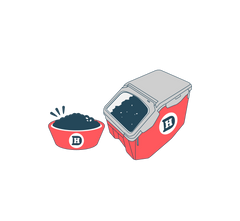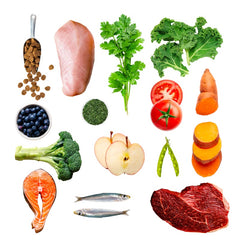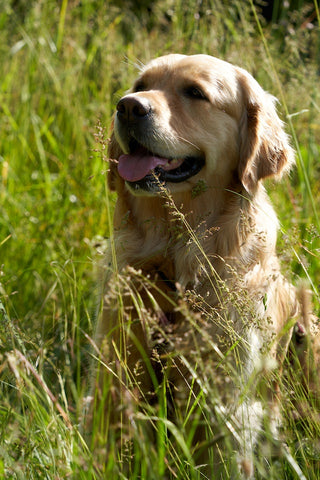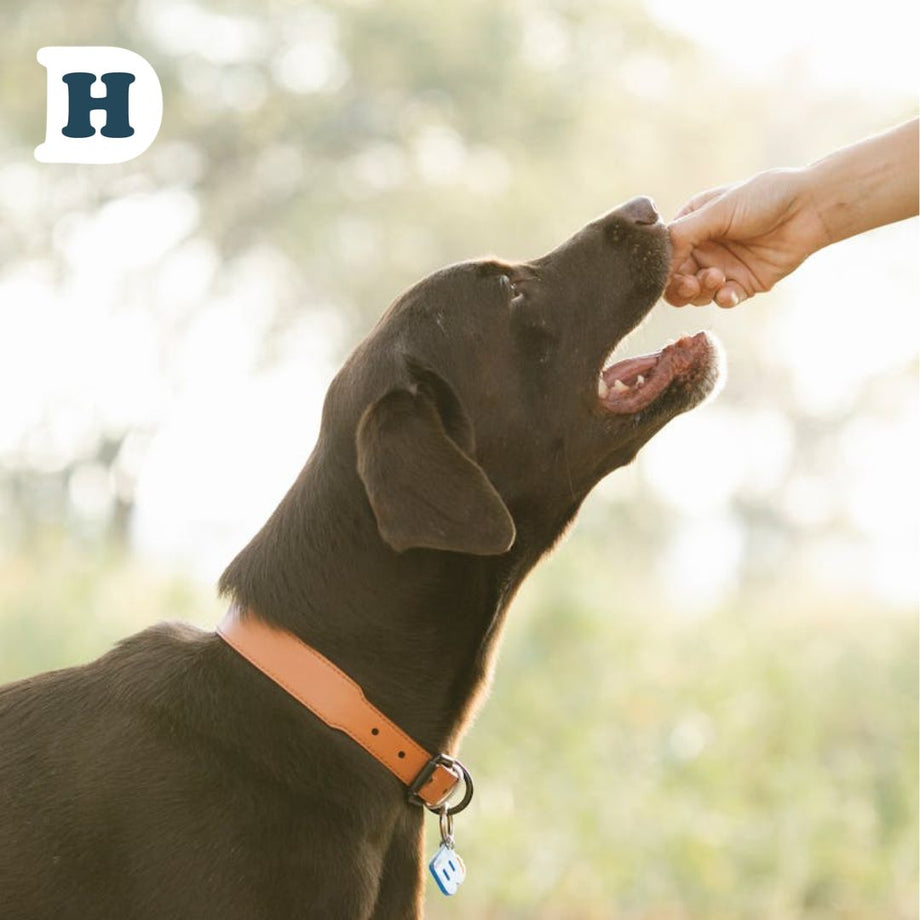Are you a dog owner who is concerned about your furry friend's health? If so, you may have wondered about the link between common allergies in dogs and grain. It's no secret that allergies can cause discomfort and even serious health issues for our beloved pets. One potential culprit that has gained attention in recent years is grain.
Many dog owners have turned to grain-free diets as a solution to alleviate their pets' allergy symptoms. But what exactly is the connection between allergies and grains?
In this article, we will explore the benefits of a grain-free diet for dogs with allergies, and how it can improve their overall well-being.
Get ready to discover the power of nutrition and make informed decisions for your four-legged companion.
Understanding Common Allergies in Dogs
Allergies in dogs can be categorised into three main types: flea allergy dermatitis, atopic dermatitis, and food allergies. Flea allergy dermatitis occurs when a dog is hypersensitive to flea saliva. Atopic dermatitis, on the other hand, is caused by environmental allergens such as pollen or dust mites. Food allergies, as the name suggests, are triggered by certain ingredients in a dog's diet. While grains are not the only potential allergens, they have become a focus of attention due to their prevalence in commercial dog food and anecdotal evidence suggesting their link to allergies.
Grains such as wheat, corn, soy, and rice are commonly used in dog food as a source of carbohydrates. However, some dogs may have difficulty digesting these grains, leading to adverse reactions. This has led to the rise of grain-free diets as an alternative for dogs with allergies.
The Role of Grains in Dog Allergies
Grains have been a staple in commercial dog food for decades. They are often used as fillers and a source of energy for dogs. However, some dogs may have an adverse reaction to grains, leading to symptoms such as itchy skin, chronic ear infections, gastrointestinal issues, and even behavioral changes. While the exact mechanism behind grain allergies in dogs is not fully understood, it is believed that proteins found in grains may trigger an immune response in certain individuals.
It's worth noting that not all dogs are allergic to grains. In fact, most dogs can tolerate grains without any issues. However, for those dogs who do have grain allergies, eliminating grains from their diet can lead to a significant improvement in their overall health and well-being.
Benefits of a Grain-Free Diet for Dogs
Switching to a grain-free diet can offer several benefits for dogs with allergies. One of the most noticeable improvements is in their skin and coat health. Dogs with grain allergies often suffer from dry, itchy skin and dull coats. By removing grains from their diet, the inflammation caused by the allergic reaction is reduced, resulting in healthier skin and a shinier coat.
In addition to skin and coat improvements, a grain-free diet can also help alleviate gastrointestinal issues. Dogs with grain allergies may experience symptoms such as diarrhea, vomiting, and excessive gas. By eliminating grains, the digestive system is relieved from potential irritants, leading to a healthier gut and improved digestion.
Another benefit of a grain-free diet is weight management. Grains, especially those with high carbohydrate content, can contribute to weight gain in dogs. By removing grains from their diet and replacing them with high-quality protein sources, dogs can maintain a healthy weight and reduce the risk of obesity-related health issues.
can maintain a healthy weight and reduce the risk of obesity-related health issues.
Furthermore, grain-free diets often contain a higher concentration of animal-based protein sources, which are essential for optimal muscle development and overall health. These diets are typically rich in ingredients such as meat, fish, and eggs, providing dogs with the nutrients they need to thrive.
Grain-Free Dog Food Options
 If you're considering switching your dog to a grain-free diet, you'll be pleased to know that there are numerous options available. At Delivery Hound HQ, like us, our mates at Man’s Best believe a premium grain free recipe is superior. And like us, dogs didn’t evolve eating grains, which can cause difficulty digesting them. They evolved from wolves, used to a protein rich diet of horse, bison and deer. And although dogs can break down grains more effectively than wolves – many of them still struggle. Many dogs are allergic to corn, wheat and other grains which are often the source of skin issues and digestive problems. Learn how to have Man's Best Grain-Free Dog Food delivered to your door, Sydney wide, with Delivery Hound here .
If you're considering switching your dog to a grain-free diet, you'll be pleased to know that there are numerous options available. At Delivery Hound HQ, like us, our mates at Man’s Best believe a premium grain free recipe is superior. And like us, dogs didn’t evolve eating grains, which can cause difficulty digesting them. They evolved from wolves, used to a protein rich diet of horse, bison and deer. And although dogs can break down grains more effectively than wolves – many of them still struggle. Many dogs are allergic to corn, wheat and other grains which are often the source of skin issues and digestive problems. Learn how to have Man's Best Grain-Free Dog Food delivered to your door, Sydney wide, with Delivery Hound here .
There are many benefits to feeding your dog a grain-free diet such as Man's Best for Dogs. One of the primary benefits is that grain-free dog food is made with high-quality ingredients that are easier for dogs to digest. Many grain-based dog foods contain ingredients that can cause digestive issues, such as bloating, gas, and diarrhea. Grain-free dog food is made with high-quality proteins, such as chicken, lamb, and fish, as well as quality carbohydrates such as sweet potato which is easier for dogs to digest.
Another benefit of a grain-free diet is that it can help improve the overall health of your dog. Grain-free dog food is often made with nutrient-dense ingredients that provide your dog with the vitamins and minerals they need to maintain good health. Additionally, many grain-free dog foods are formulated to support specific health issues, such as joint health or weight management.
Transitioning Your Dog to a Grain-Free Diet
When transitioning your dog to a grain-free diet, it's important to do so gradually. Sudden dietary changes can upset a dog's digestive system and lead to gastrointestinal issues. Start by mixing a small amount of the new grain-free food with your dog's current food, gradually increasing the proportion of the new food over the course of a week or two. This allows your dog's digestive system to adjust to the new diet without any major disruptions.
During the transition period, it's important to monitor your dog for any signs of discomfort or adverse reactions. When introduced gradually and in appropriate quantities, grain-free dog food is generally safe for dogs. However, it is important to monitor your dog for any adverse reactions. Follow our transition feeding guide here for best results.
Learn more about, How To Transition Your Dog To A New Food here.
Tips for Maintaining a Grain-Free Diet for Your Dog
Once your dog has successfully transitioned to a grain-free diet, there are a few tips to keep in mind to ensure their dietary needs are met:
1. Read the labels: Even if a dog food is labeled as grain-free, it's important to read the ingredients list to ensure that it meets your dog's specific needs. Look for high-quality protein sources, healthy fats, and a balanced blend of vitamins and minerals.
2. Avoid excessive treats: While it's tempting to spoil our furry friends with treats, it's important to choose grain-free options that complement their main diet. Avoid overfeeding treats, as this can lead to weight gain and an imbalance in their overall nutrition. Learn more about how many treats you should be feeding your hound here: From Good Boy to Great: Responsible Treats for Positive Dog Training
3. Monitor your dog's weight: Regularly check your dog's weight and body condition to ensure they are maintaining a healthy weight. Adjust their portion sizes as needed to prevent under or overfeeding.
4. Regular veterinary check-ups: It's important to schedule regular check-ups with your veterinarian to monitor your dog's overall health and discuss any concerns or changes in their diet.
Grain-Free Dog Treats and Snacks
In addition to their main meals, it's important to choose grain-free treats and snacks for your dog. Many pet stores now offer a wide variety of grain-free options, including biscuits, dental chews, and jerky treats. These treats are formulated to be both delicious and nutritious, providing a healthy alternative to grain-based treats.
When selecting grain-free treats, look for those made with high-quality ingredients and free from artificial additives. Consider the size and texture of the treat to ensure it's appropriate for your dog's breed and size. Always supervise your dog while they are enjoying their treats to prevent choking or other accidents.
Grain-Free Diet and Potential Health Benefits for Dogs
Aside from alleviating allergies and improving skin and coat health, a grain-free diet may offer other potential health benefits for dogs. Some dog owners have reported improvements in energy levels, digestion, and overall vitality after switching to a grain-free diet. While individual results may vary, it's clear that nutrition plays a crucial role in a dog's well-being.
It's important to note that a grain-free diet is not a cure-all solution for every dog. Each dog is unique, and what works for one may not work for another. If you suspect that your dog has allergies or dietary sensitivities, it's always best to consult with a veterinarian for a proper diagnosis and guidance on the best dietary approach for your furry friend.
Common Misconceptions about Grain-Free Diets for Dogs
There are some common misconceptions surrounding grain-free diets for dogs that are worth addressing. One of the most prevalent misconceptions is that grains are inherently bad for dogs and should be completely eliminated from their diets. While it's true that some dogs may have allergies or sensitivities to grains, most dogs can tolerate them without any issues.
Another misconception is that grain-free diets are automatically healthier than diets that include grains. While a grain-free diet can offer benefits for dogs with allergies, it's important to ensure that the diet is balanced and meets all of the dog's nutritional needs. Simply removing grains from a diet does not guarantee optimal nutrition.
It's also worth mentioning that grain-free diets are not suitable for all dogs. Puppies, pregnant or lactating dogs, and dogs with certain medical conditions may have specific dietary requirements that include grains. It's important to consult with a veterinarian to determine the best diet for these special cases.
Making the Best Dietary Choice for Your Dog
There is a link between common allergies in dogs and grain, although not all dogs are affected. If your dog is experiencing allergy symptoms and you suspect grains may be the culprit, a grain-free diet may be worth considering. By eliminating grains from your dog's diet, you can potentially alleviate their allergy symptoms, improve their skin and coat health, and promote overall well-being.
However, it's important to remember that each dog is unique, and what works for one may not work for another. It's always best to consult with a veterinarian for a proper diagnosis and guidance on the best dietary approach for your furry friend.
Ultimately, the goal is to provide your dog with a balanced, nutritious diet that meets their specific needs. Whether that includes grains or not, the most important thing is to prioritise their health and well-being. So, do your research, consult with professionals, and make informed decisions for your four-legged companion. They'll thank you with wagging tails and endless love.
When introduced gradually and in appropriate quantities, grain-free dog food is generally safe for dogs. However, it is important to monitor your dog for any adverse reactions. Follow our transition feeding guide here for best results.







